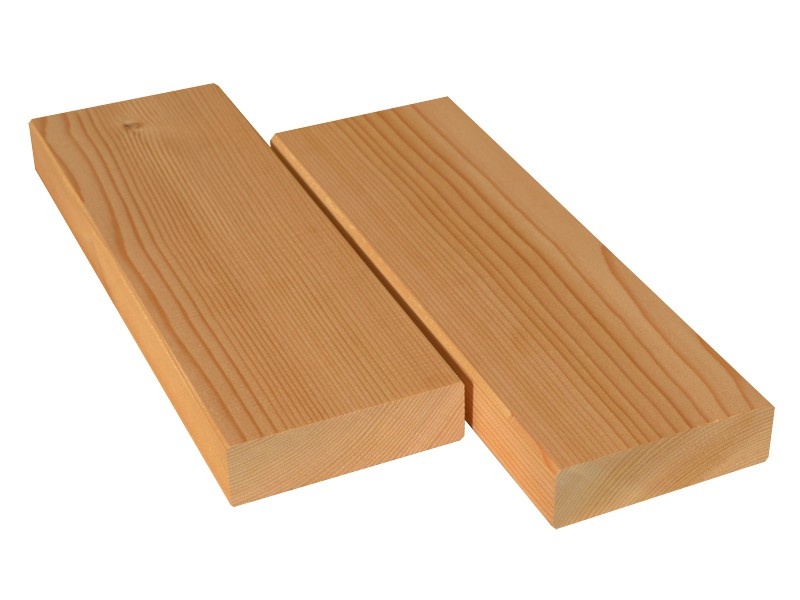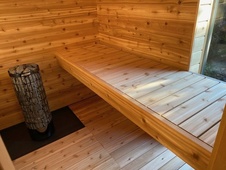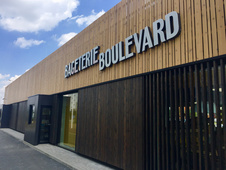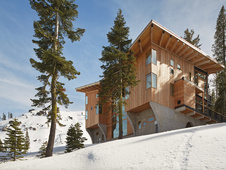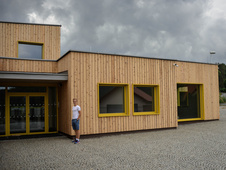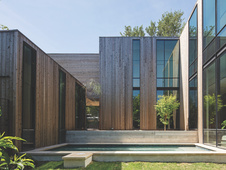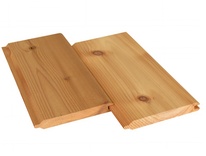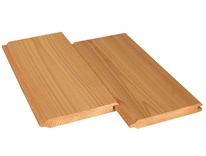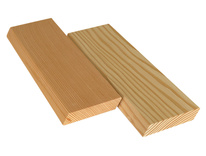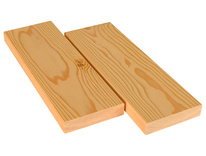Western Red Cedar, planks 26x85 mm, STK grade
Detailed Description
Western Red Cedar, STK, planks 26x85 mm
Specie: Western Red Cedar
Botanical name: Thuja plicata
Origin: Canada
Size: 26x85x2100-5700 mm
Density: approx. 400 kg/m3
Durability class EN350: 2
Wood drying: KD
Usage: outdoor cladding
Grading: STK / Elite, select knotty
Profile: planks
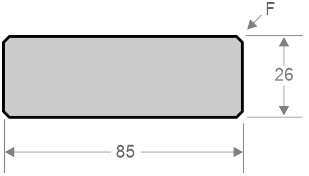
Specification points
About Western Red Cedar
Western Red Cedar is a legend among tree species and thanks to its unique features, it is best choice for your wooden construction and house cladding. No torsion, high stability, long service life, gorgeous scent, weather resistance and resistance against insects, this is only a fraction of its unique features that have been known for generations. Western Red Cedar in Elite grading is characterized by an unlimited number of knots.
Specific weight
One of the lightest commercially used softwood types, Western Red Cedar dried in a kiln, has a specific weight of about 400 kg / m3. The low density of Western Red Cedar increases its thermal insulating properties and is why this wood is easy to transport and why it is easy to handle.
Dimensional stability
Like any other wood, the red western cedar is hygroscopic and absorbs or releases moisture to stay in balance with the surrounding environment. However, it has a very low shrinkage factor and, compared to other coniferous lumber, it is very resistant to bruising, twisting and cracking.
Thermal conductivity
Wood is an excellent thermal insulator. This is a very important feature because good heat-insulating materials help to keep cool in the interior of the building in the summer and reduce the cost of heating in the winter. The thermal conductivity of the wood is directly dependent on its density (specific weight). Low density wood has the best thermal insulation properties because such wood contains a large number of lumps. If the wood is dry, these cavities are filled with air, which is one of the best known thermal insulators. Red Cedar Red is one of the best thermal insulators, thanks to its low density and large proportion of air cavities, compared to other commonly available types of softwood and incomparably better than bricks, concrete and steel. It has a thermal conductivity coefficient (k value) at 12% humidity of 0.74 BTU inch / ft2h degrees F (0.106 Wm-1K-1).
Sound insulation properties
An important feature of wood in terms of sound insulation is the ability to absorb vibrations. Wood has a cellular structure made up of tiny interconnected pores which, through friction and viscoelastic resistance, convert noise to thermal energy. Due to the large internal friction generated in the cellular porous structure, wood has a much greater ability to dampen the sound than most building materials. Floor, ceiling and wall constructions can provide cost-effective sound insulation when properly used. Red Western Cedar is particularly suited for this purpose and can be used to reduce noise or to quiet the room.
Lifetime
In the past, natives on the Pacific coast valued red western cedar for its durability and stable quality, and used wood and bark for most building structures. The proof of durability and therefore long life is a range of red cedar red products, which are still in very good condition. If the red west cedar is well treated and maintained, its life spans in decades. If it is to be exposed to conditions that may cause it to fall aside, such as when the wood is in contact with the soil, the red western cedar must be treated with a suitable wood coating.
Avoid contact with corrosive metals
Contact of wood with corrosive metals can cause black stains on the wood. Hot-dipped galvanized, aluminum and stainless steel nails are all corrosion-resistant and can be used to nail Western Red Cedar. Other types of nails are not recommended. They can rust and disintegrate and react adversely with the natural preservative oils present in cedar resulting in stains and streaks. Copper nails also react with cedar and should not be used. Stainless steel nails are the best choice, especially if the siding is to be finished with transparent stain. Use No.304 stainless for general siding applications and No.316 for seacoast exposures.
Wood color tolerance
Each piece of wood is a unique original originating from growing trunks, and it is never possible to achieve uniformity in the color of wood or in the structure. Red Western Cedar occurs in many color shades, distinct color variations are characteristic of this species and are permitted without limitation in the best Clear classification. If western red cedar is exposed to UV rays, it becomes grayed out after time, as is the case with all tree species.
Download
Demand
We will show you our products before purchase in our warehouse. Wood is a natural material, each piece is a unique original. The supplied wood will be different from the displayed photos and samples.
Call us on +420 220 879 443
Payment options:
- Cash or a card at the store
- Cash on delivery (you pay when picking up the goods to the courier in the Czech area only )
- By bank transfer (we will send the goods immediately after the amount has been credited to our account)

